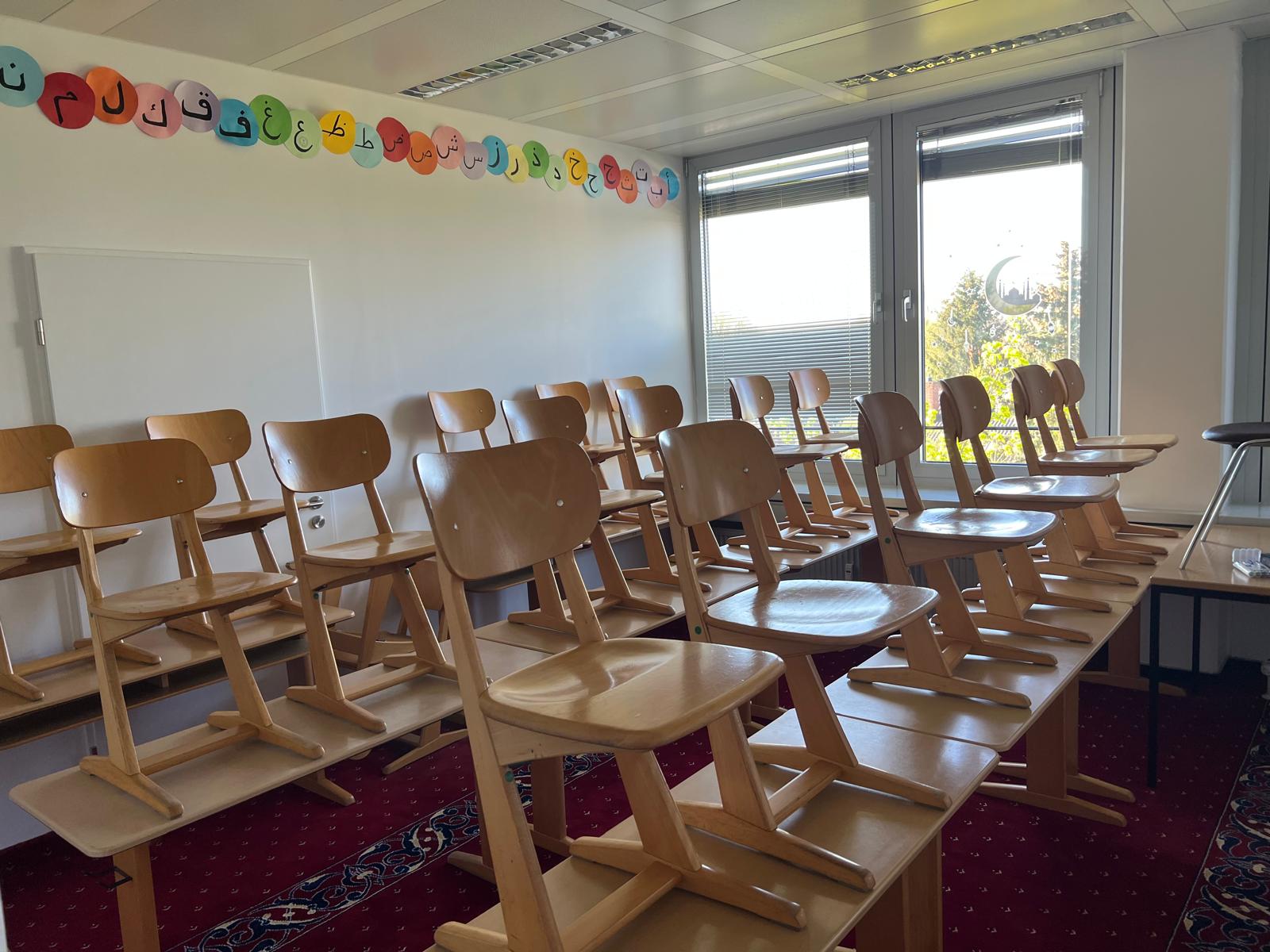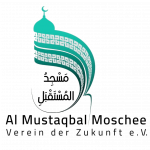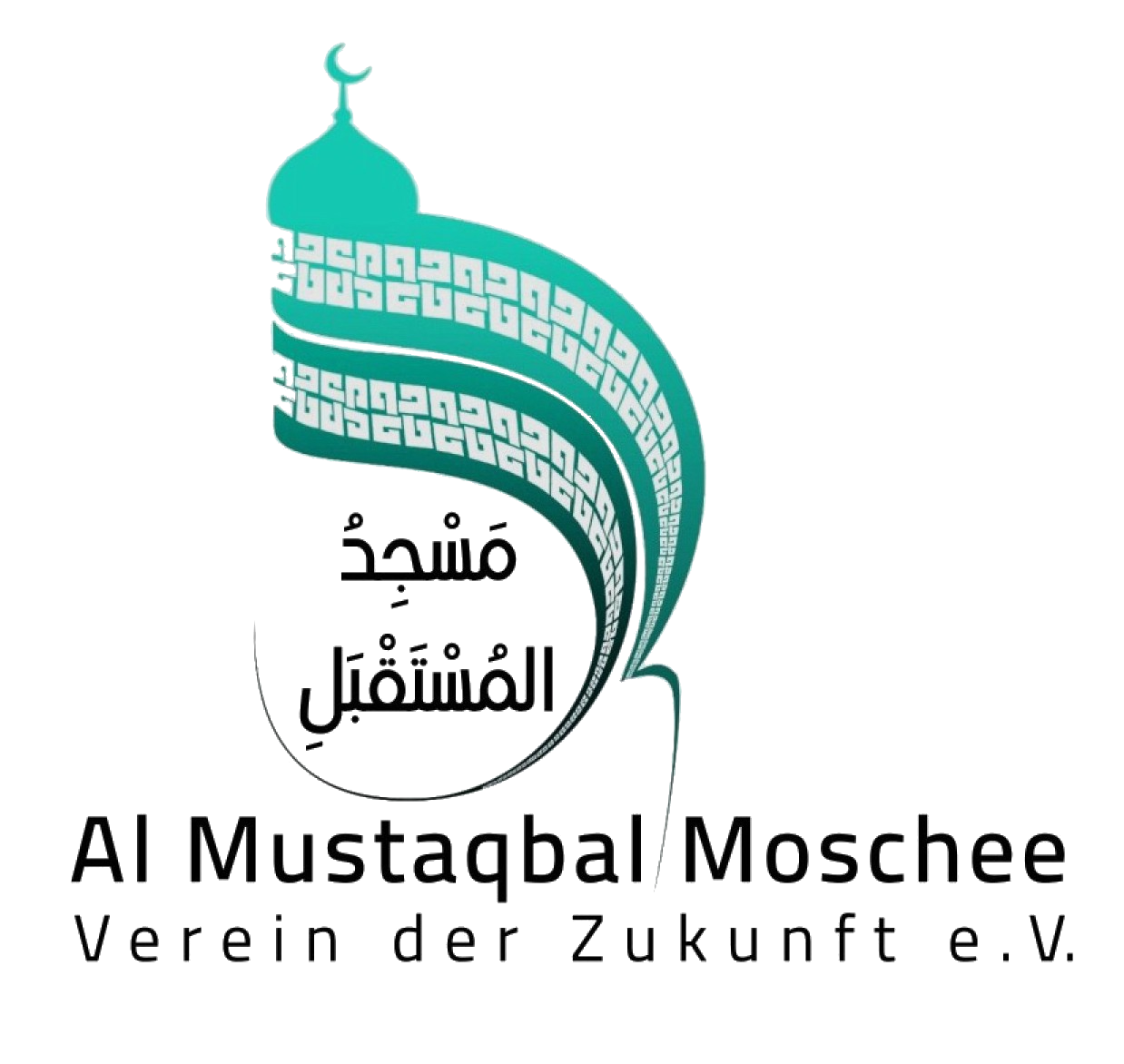Arabic language classes

Kindergarten Arabic Course (3–5 years)
In the first years of life, children develop key skills that will accompany them throughout their lives. Early contact with the Arabic language not only strengthens their linguistic development, but also their emotional connection to their own religion and culture. In our kindergarten course, children experience the Arabic language in an environment characterized by trust, joy and Islamic values.
Through stories of the prophets (عليهم السلام), songs, games and creative activities, the first letters and important terms are introduced. At the same time, we lay the first foundations of faith in a playful way by introducing the prayer (Ṣalāh) in a child-friendly way and teaching Islamic etiquette. Our aim is to open the children’s hearts to the Arabic language and their religion and to build a positive relationship with both.
Our teaching concept combines language, religion and social skills in a harmonious way – so that our children grow up strong, self-confident and deeply rooted in their identity.
Prerequisites
- The child no longer wears diapers.
- He/she can express independently when he/she needs to go to the toilet.
- They understand simple instructions and can communicate in basic language.
Goals of the course
- First encounter with the Arabic language and culture
- Getting to know the Arabic alphabet through playful methods
- Promoting a feeling for language and the ability to express oneself
- Introduction to basic Islamic knowledge through prophet stories and Islamic games
- Gentle, age-appropriate introduction to prayer

Preschool Arabic (from 6 years)
In a warm, cheerful atmosphere, the children immerse themselves in the Arabic language in a playful way. The focus is on the confident recognition and writing of letters as well as the first simple attempts at reading. Creative handicraft and painting activities, decorating the classroom together and lively learning games ensure that learning is combined with fun. The children experience the mosque as a place of security, friendship and enthusiasm for knowledge. Through loving guidance, interest in the Arabic language and the faith is awakened and strengthened.
The teaching material has been specially developed for this age group from our own experience and guarantees a gentle and successful introduction.
Prerequisites
- The child can hold a pencil securely and trace simple letters or shapes.
- No previous knowledge is required.
Goals of the course
- Confident recognition and writing of Arabic letters
- First letter combinations and easy reading
- Developing enjoyment of the Arabic language
- Building a love of the mosque and community

Arabic 1st grade
The lessons in Year 1 encourage children to enjoy reading and writing in Arabic through a clearly structured, creative approach. With varied exercises, short poems, short texts and child-oriented projects, learning progress is made visible and positively reinforced. At the same time, the children develop a stronger feeling for the beauty of the Arabic language and the values of Islam.
The classroom becomes a lively place of learning where children can grow in a supportive community, make friends and experience the mosque as a second home. The combination of language development, Islamic education and creative tasks ensures that learning happens with heart and mind.
The teaching material is specially tailored to the needs of Arabic-speaking children and is based on years of experience.
Prerequisites
- Recognize and write Arabic letters with confidence
- First reading experience available
Goals of the course
- Read short passages fluently and confidently
- Basics of Arabic grammar (e.g. declension, simple sentence formation)
- Error-free writing and beautiful handwriting
- Understanding and writing simple dialogs
- Memorizing and creatively performing short poems
- Strengthening Islamic knowledge (Duʿāʾ, Adhkār, pillars of faith)

Arabic 2nd grade
In Year 2, the children experience how much fun language can be. The classroom becomes a lively space that visibly reflects their learning progress: with their own texts, colorful projects and creative work. The aim is not only to become more confident in Arabic, but also to strengthen friendships, live Islamic values in everyday life and experience the mosque as a place of joy and trust. The lessons place great emphasis on personal development and on accompanying and supporting the children on their journey of faith.
Prerequisites
- Successful completion of 1st grade Arabic (reading simple words and sentences)
Goals of the course
- Read first simple stories fluently
- Recognize letter combinations, simple words and short sentences
- Grasping main ideas from very short texts
- Writing short sentences (e.g. introducing yourself, short descriptions)
- Introduction to basic terms: Nouns (اسم), verb (فعل), particle (حرف)
- Understanding simple sentence structures (who does what?)
- Introduction to the past tense
- Strengthening Islamic values: respect for people (Ihtiraam an-Naas), behavior in traffic (Adab at-Tariq), mercy (Rahmah), appreciation of knowledge (Talab al-ʿIlm)

Arabic 3rd grade
In Year 3, the Arabic language becomes more and more secure and lively for the children. Through targeted exercises in reading, writing and comprehension, they develop a deeper feeling for the language. The focus is on more complex sentence structures, a broader vocabulary and the first longer texts.
Islamic content such as Qurʾān verses, life stories of the prophets (Sīrah), doctrine of faith (ʿAqīdah) and ethical behavior are deepened. At the same time, togetherness in the mosque is strengthened and the joy of learning and faith is further consolidated – an important basis for character development and everyday life.
Here, too, we work with a specially created textbook that is based on years of experience and optimally supports learning success.
Prerequisites
- Secure mastery of the contents of 2nd grade
Goals of the course
- Fluent reading and accurate comprehension of longer texts
- Use of articles, singular/plural, masculine/feminine and personal pronouns
- Forming sentences, tenses (present/past) and questions
- Improving spelling and writing short texts
- Expanding vocabulary relating to everyday life and faith
- Islamic studies: deepening through suras, Adhkār, doctrine of faith, Sīrah and rights of Muslims among themselves

Arabic 4th grade
This course not only strengthens Arabic language skills, but also supports the children in their Islamic and personal development. In a friendly environment, they make friends, can ask questions and receive Islamic answers and guidance for school, everyday life and their future. The mosque thus becomes a place of joy, trust and shared growth.
Prerequisites
- Successful completion of the 3rd grade Arabic course
- Confident reading and basic grammar skills
Goals of the course
- Improving reading fluency and text comprehension
- Promotion of written expression and independent writing
- Application of grammatical structures, tenses and sentence types
- Expanding vocabulary and confident use of prepositions and adjectives
- Developing language awareness through structured exercises
- Deepening Islamic knowledge: belief in the Last Day, important Adhkar, Ramadan program, miracles of the Prophet ﷺ, Isra and Mi’raj

Arabic 5th grade
In Year 5, pupils continue to grow linguistically and personally. They not only deepen their language skills, but also find the mosque a place where they can make friends, experience support and strengthen their character in the light of Islamic values. Especially at this age, it is important to offer young people a safe and positive space in which they can ask their questions, find Islamic answers and exchange ideas with each other.
The lessons therefore combine language development, Islamic education and social development in a creative and motivating way.
Prerequisites
- Successful completion of the 4th grade Arabic course
- Confident reading and consolidated basics in grammar and text comprehension
Goals of the course
- Deepening reading fluency and increasing reading speed
- Developing a deeper understanding of texts through more complex content
- Expanding the ability to write longer, structured texts
- Strengthening grammatical confidence in sentence structure and language use
- Promoting critical thinking by analyzing and interpreting texts
- Application of grammatical rules (tenses, sentence types, word types) when writing and speaking
- Expanding vocabulary and stylistic expression
- Deepening Islamic knowledge: understanding the Qur’an, purity (Tahara), major sins (Kaba’ir), faithfulness (Amanah), rules of conduct in gatherings (Adab al-Majlis), rules of prayer (Ahkam as-Salat), Wudu and rules of etiquette when eating

Arabic 6th grade
Grade 6 takes students to a new level in language and character development. As their knowledge grows, the classroom becomes a place that encourages independence and critical thinking. Texts are not only read, but understood, questioned and interpreted. At the same time, the children continue to grow in their personalities, strengthen their Islamic values and find stability and support in the community. Attending the mosque should continue to be associated with joy, trust and the feeling of having found a place where faith and learning go hand in hand.
Prerequisites
- Successful completion of 5th grade Arabic
Goals of the course
- Understand complex, longer texts and stories
- Distinguish between main ideas and details
- Analyzing content and interpreting the intentions of texts
- Write your own structured texts (e.g. letters, short reports, essays)
- Use sentence types confidently (nominal and verbal sentences)
- Use extended tenses correctly: Past, present, future
- Use complex structures (e.g. relative clauses, conjunctions)
- Use stylistic devices such as descriptions, comparisons and expressions of opinion
- Deepening Islamic topics: explanation of selected suras, truthfulness (As-Sidq), faith as a statement, deed and conviction (Al-Iman Qawl, Amal wa I’tiqad), Zakah, good treatment of parents (Birr al-Walidayn)

